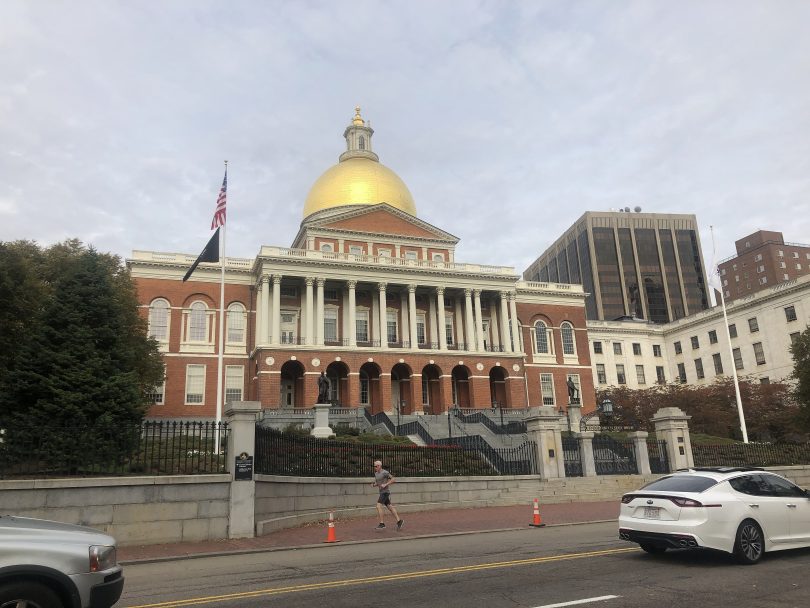By Sam Drysdale
BU News Service
When Bismarelis Inla applied for United States citizenship four years ago, the civics exam was administered by one U.S. Citizen and Immigration Services official. Two years later, in 2018, her husband’s test was administered by three officials. The trend of increased barriers to citizenship over the past few years, Inla said, continues with the latest blow — a new, more challenging version of the civics exam.
Applicants for naturalization who apply on or after Dec. 1, 2020, will take a revised version of the civics test that includes a greater number of questions, as determined by USCIS. Advocacy agencies and lawmakers in Massachusetts worry about what these changes could mean for the 200,000 green cardholders in the state, especially in gateway cities with large immigrant communities.
“It just adds another barrier to an already complex process,” said Eva Millona, CEO and president of the Massachusetts Immigrant and Refugee Advocacy Coalition.
The old version of the test, which had been in place since 2008, required applicants to study a pool of 100 questions about American history, government and geography. The exam was conducted in an interview style, where a USCIS official selected 10 of those 100 questions, and the applicant had to answer six correctly to pass.
The number of potential questions in the 2020 civics test has increased from 100 to 128, and interviewees are asked 20 questions as opposed to 10. Now, those applying for naturalization have to answer 12 of the 20 questions correctly to pass the exam.
“USCIS revised the civics test as part of a decennial update to ensure that it remains an instrument that comprehensively assesses applicants’ knowledge of American history, government and civic values,” according to a press release from the agency.
The increase in the number question pool and number of questions provides applicants with “more opportunities to learn about the United States as part of the test preparation process,” according to the release.
The new version of the civics exam also changes the wording of many of the questions, making them “more complex” and featuring more “abstract concepts,” according to Millona.
“For those individuals who have less formal education and who have lower English proficiency, it is going to be even harder and block people from completing their citizenship,” she said.
Even though the naturalization process already includes portions on English writing and speaking, the new questions require a greater level of English proficiency than older questions did, said Jessica Chicco, a staff attorney at the MIRA Coalition.
Inla, an immigrant from the Dominican Republic who has lived in New Bedford for 11 years, said though she and her husband have both obtained citizenship in the past few years, she is concerned about these changes affecting members of her community.
“I know many, many people who want to go through this process, and some of them don’t speak English well,” she said. “And now you have to know more people, answer more questions; you have to study for more time and know more information.”
Rep. Antonio F. D. Cabral, D-New Bedford, said that this change will likely affect many people who live in his New Bedford community, and they will undoubtedly have to study and prepare more than ever before. He said, however, that he is confident that applicants will remain successful.
“These folks are driven and they have a goal to be US citizens,” he said. “That’s what immigrants are, they are a community with goals to achieve; they want to make life better for themselves and better for their kids and their grandkids eventually.”
Inla works with the Community Economic Development Center, a New Bedford-based organization that focuses on community-based economic development programs. CEDC is one of many advocacy organizations that helps prepare citizenship applicants for this process.
Sixteen months after USCIS originally announced a plan to change the naturalization process, the revised civics test was released on Nov. 13, 2020. Millona said the two weeks between when the exam was made public and when it would be administered didn’t allow community groups enough time to prepare applicants.
The CEO and president of the MIRA Coalition blamed the Trump administration, saying the U.S. president was trying to create more immigration regulations on his way out of office.
“What the USCIS claims is that these changes will more accurately assess applicants’ knowledge of American history, government and civic values, despite little evidence that the current test inadequately assessed this knowledge,” Millona said. “So what it comes down to, in our view, is that this is another attempt by the Trump administration to add another unnecessary barrier to citizenship.”
Both Millona and Chicco said that while they worried about the revised naturalization process, they are hoping President-elect Joe Biden will reverse the change before it has any real negative impact.
Due to administrative backlog and slower processing time during the COVID-19 pandemic, applicants for citizenship aren’t getting to the interview portion of the process until about six months after they submit their application. Therefore, those applying in December likely won’t take the civics exam until next summer — several months into Biden’s presidency.
“Looking at the Biden platform, we know where he stands,” Millona said. “We are pretty sure that he will reverse this choice.”
Over the next few months, MIRA will be working both to prepare applicants for either version of the civics exam, and also advocating to the president-elect’s administration to reverse the change.
Cabral said while he is confident that immigrants will overcome this challenge, he hopes to help applicants in his community any way he can.
“Whenever someone arrives at our shores, someone who immigrates, they come with nothing and they contribute so much for the enrichment of our country and our communities,” Cabral said. “We should be supportive and facilitate the ability of them to become US citizens, instead of creating additional barriers.”





